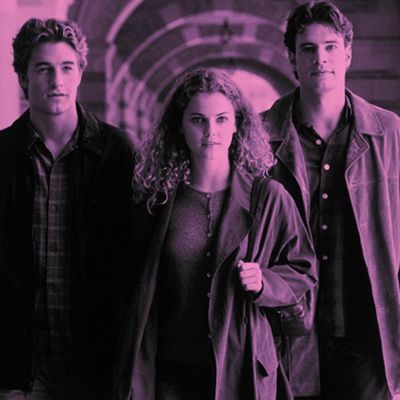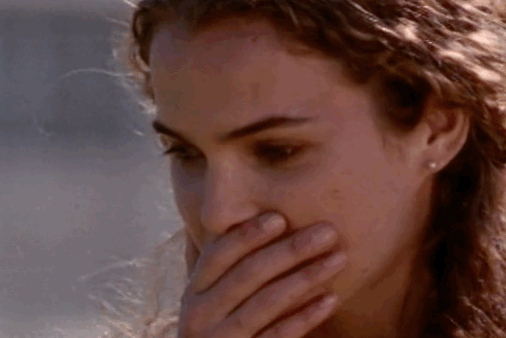
For the next three weeks, Vulture is holding a TV Couple Scuffle to determine the greatest couple on television in the past 30 years. Below, we revisit one of TV’s greatest love stories that didn’t make the bracket: Felicity and Noel/Ben.
On one hand, Felicity moved across the country to chase after Ben. On the other, Noel convinced her to stay in New York. Ben was the perfect fantasy. Noel understood her as a person. Ben, as played by Scott Speedman, had the hair of a Greek god. Noel (Scott Foley), the kind of smile that makes you feel like he’d get your inside jokes. Also, he has stunning hazel-green eyes, like sunlight filtering through a forest — though, to be fair, Ben has great eyes, too.
Created by Matt Reeves and J.J. Abrams, Felicity follows Keri Russell from high school in California to college in New York (think NYU with more earth tones), where she decides between being premed and studying art, and mostly, between two handsome men who were, for the most part, equally in love with her. The late ’90s WB classic had other fascinations: It was a show about college, about moving to New York, about whispering, flannel, and bad haircuts. But really, it was about Noel and Ben, and why Felicity couldn’t chose between them. They form one TV’s greatest love triangles, mostly because that triangle tells us so much about Felicity herself.
But while this trio made for great TV, as couples, they were terribly boring. As lovable as the men are, the relationships between them and Felicity are, in isolation, dull. Felicity and Ben are the college sweethearts that, five years in, would get into screaming fights about what kind of rug to buy at Ikea. Felicity and Noel are the nerdy couple as best friends that have the most sexual chemistry while playing Boggle and would try to make small talk about their favorite board games at your dinner party and then leave early because of “you know, traffic.” Felicity, as a television show, was less about the work that comes with being in a couple, than the infatuation of imagining it. If Felicity committed to either boy early on, the series would’ve been canceled faster than you can mutter “Dear Sally” into the nearest tape recorder.
But the utter ordinariness of Felicity’s couples worked to its love triangle’s advantage. As long as Felicity was confused, as long as Felicity was, like most college students, a little selfish and certainly not satisfied with “ordinary,” she was interesting. If actors can excel at certain emotional states, Keri Russell excels at shock. In the pilot, she sells the notion that her character would throw everything away for a boy — after merely seeing him wave — by glancing away, and hiding a laugh.

When Felicity was compelling, the show was, too. In a standard TV love triangle, there’s usually an obvious answer. We just have to wait for the protagonist to realize it. To Jim on The Office, Karen was only ever a distraction from Pam, the same way that any number of other love interests briefly stood in the way of Ross and Rachel, Seth and Summer, Ted and How I Met Your Mother’s mother — or wait, actually, Robin. “Right,” by the way, doesn’t necessarily mean “best”; sometimes the hero chooses the jerk. Aidan might be a better match in many ways for Carrie on Sex and the City, but she can’t give up Big. Sure, Scott Foley revealed he had secret-agent abs on Scandal, but do you believe Olivia will ever give up on Fitz? Maybe you want her to, but on TV, nice guys lose, and fantasies tend to win (unless those fantasies involve Dawson and Joey).
On Felicity, Ben, the fantasy, wins, too, but only after years of hemming and hawing, as Felicity switched back and forth in her convictions, like a curly-haired weather vane on a gusty fall day. After a stellar first season, Felicity cut her hair (which wasn’t that bad), and Felicity started to lean more on gimmicks. The increasingly small flock of viewers was treated to a set of Real World–esque documentary episodes, a regrettable romance between Ben and Lisa Edelstein, and a Twilight Zone homage, just for the sake of it. Then, Felicity made what was widely regarded as its worst decision, though it revealed a lot about the show’s own fascinations: When the WB ordered five more episodes after a planned series finale, the writers sent Felicity back in time to choose Noel over Ben, because her Wiccan roommate can actually do magic.
The time-travel episodes of Felicity are my favorite collection of oddities to air on TV. In every episode, the pacing is off: Felicity insists she has to be with Noel, and Noel, suddenly, is turned off by her confidence. Felicity goes to a mental hospital. Jennifer Garner drops in from Alias, and there’s a throwaway line about how she’s suddenly so fit. Her friend Elena dies in the present; Noel dies in the past; back in the future, Elena is alive again. These episodes also feel akin to the modern-day reboot, which Abrams later championed in Star Trek and Star Wars. A reboot chases after the feeling of falling in love with a fictional universe — think of Felicity trying to get back to that one moment of pure infatuation with Ben — more often than it engages with the universe itself. To anyone bothered by how much The Force Awakens resembles A New Hope, or how much Star Trek Into Darkness replicates The Wrath of Khan, know that that series finale of Felicity is a clip show where, having gone into to the past to choose Noel, Felicity explains the plot of Felicity to a magician, so that she can go back to the present and choose Ben. It’s moving, in a stupid, impractical, baldly idealistic way. Abrams, a Don Draper with thick-framed glasses, only likes the beginnings of things. Felicity is something of an antihero, too: She’s so good at falling in love that she has trouble being in a relationship.
What does this have to do with love triangles? As a narrative structure, a love triangle propels a story forward. Romances give characters, especially female ones, a way to figure themselves out. Gilmore Girls’ Rory Gilmore might be the best TV example of this trope, as her character matures through a succession of boyfriends: Dean, Jess, Logan, and hopefully in the Netflix version, someone else entirely. Or think of Jane Austen, who welded the courtship plot (who’s your hero going to marry?) to the bildungsroman (how’s your hero going to grow up?): Elizabeth Bennet learns from her fling with Wickham, and arrives at a place where she can fall in love with Mr. Darcy.
Time travel mucks with that progression, even if Felicity’s trip to the past is meant to reaffirm her commitment to Ben. But it’s not just time travel: Felicity starts the series in love with Ben and Noel. By the end of the series, she has grown as a person, but she still has feelings for both guys, even as she chooses between them. In a very 19th-century way, the love triangle teaches a protagonist (again, usually, female) to tame her desires, and limit her love to a single object. In a very turn of the 21st-century way, Felicity’s love triangle emphasized how ridiculous it is to think a protagonist could tame her desires in the first place.
Then there’s the audience. A love triangle will often separate viewers into teams: Ben or Noel, Greg or Josh, Michael or Rafael (Crazy Ex-Girlfriend and Jane the Virgin, by the way, are the two most worthy inheritors to Felicity’s great-love-triangle crown; tellingly, both are open about the fact that the love interests are secondary, and that the courtship plot is a double-edged). Those teams give viewers their own schema to talk about desire. Being Team Noel is a lot like being Team Michael, Jake, Xander, or Brian Krakow. A love triangle encourages viewers to insert themselves into a show and rehearse their own romantic decision-making. On television, especially while the series is still airing, the love triangle functions a bit like a game show – dial-in to vote for contestant A or B, the writers are standing by. (Bridget Jones’s Baby, which might as well be an installment of a TV show, has a joke to this effect.)
This creates a paradox: The ending of love triangle will nearly always disappoint your audience, unless the right choice was telegraphed early on, which would mean the love triangle wasn’t compelling in the first place. One solution: Have the protagonist choose herself, which can be effective, or all the more frustrating given the way a love triangle insists on a choice. Another: Realize that the choice doesn’t matter. Felicity’s best moments — the first-season finale, for instance, which cuts away the moment Felicity has to decide whether to take a taxi to Ben or Noel — lived in the space where Felicity loved both guys at the same time. It was a great show about indecision, when so many love stories are about choice. Because Felicity wasn’t really about the men, it was about its protagonist’s desire, her confusion, how she was overwhelmed most of the time, and just a little bit in love with that feeling — in the way that, for most of the big moments in our lives, most of us are.





